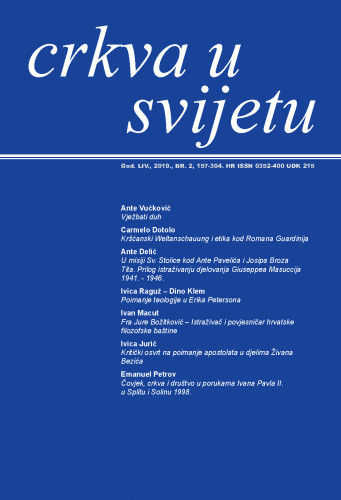Jedna od zasluga razmišljanja Romana Guardinija jest da je pridonio boljem ocrtavanju teološkog promišljanja dvadesetog stoljeća i njegova epistemološkog statusa, ponajprije u interdisciplinarnoj pozornosti i logici dijaloga. U tom smislu, hermeneutička figura Weltanschauunga čini se plodnom, sa zanimljivim razvojem: ona poziva teologiju da razmišlja o sebi i ponaša se kao intelektualni partner među ostalima, pokazujući teoretski identitet koji se može postaviti na granicu znanja koje u srcu ima razumijevanje otajstva stvarnog. Iz te perspektive religiozno iskustvo pridonosi drugačijem razumijevanju ljudskog stanja, otvarajući ga objavi kao nužnom uvjetu za pokretanje potrage za nekim važnim ključevima čitanja u tumačenju svijeta i povijesti. To donosi barem dvostruku posljedicu. Prva je tvrdnja o objavljujućoj strukturi stvarnosti u kojoj se religija pojavljuje kao poseban način nastanjivanja svijeta, u kojem se oblikuju pitanja i obzorja egzistencije. Druga je pokazatelj „kršćanske kulture“ kao radikalne i jedinstvene perspektive o čovjeku, svijetu, povijesti, koja na temelju uskrsnog događaja postaje proročanstvo smisla u sociokulturnim procesima.; One of the merits of Romano Guardini’s ideas was that he contributed to a better elaboration of the twentieth century theological thinking and its epistemological status; above all in interdisciplinary attention and the logic of dialogue. In that sense, the hermeneutic figure of Weltanschauung seems to be fruitful, with interesting development: it urges theology to think of itself and to behave as an intellectual partner among others, showing the theoretical identity that can be set to the limit of knowledge, in the heart of which there is an understanding of the mystery of the real. From this perspective, religious experience contributes to a different understanding of human condition, opening it to the revelation as a necessary prerequisite for starting a search for some important keys to reading in the interpretation of the world and history. This brings at least a double consequence. The first one is the claim of the revealing structure of reality in which religion appears as a special way of inhabiting the world, in which questions and horizons of existence are shaped. The other one is the indicator of “Christian culture” as a radical and unique perspective of man, the world and history, which on the basis of Easter event becomes the prophecy of meaning in socio-cultural processes.
Sažetak

 Crkva u svijetu : 54,2(2019) / glavni i odgovorni urednik, editor-in-chief Mladen Parlov.
Crkva u svijetu : 54,2(2019) / glavni i odgovorni urednik, editor-in-chief Mladen Parlov.